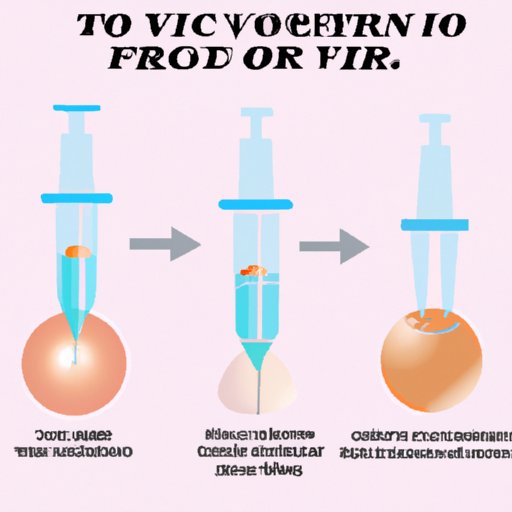
I. Introduction
For couples struggling with infertility, in vitro fertilization (IVF) can be a life-changing treatment option. During an IVF cycle, fertility specialists use a combination of hormone therapy and fertility drugs to increase the chances of pregnancy. Injections are a crucial part of the treatment, and it’s normal to feel apprehensive about the process. This article aims to demystify IVF injections by providing a comprehensive guide to understanding what they’re for, how many injections you might need, and how to manage any side effects. By the end of this article, you’ll feel more confident and prepared as you embark on your fertility journey.

II. The Ins and Outs of IVF Injections: Understanding the Process
Before we dive into how many injections you might need and how to administer them, let’s first review the basics of IVF and the role of injections in the treatment.
IVF is a form of assisted reproductive technology (ART) in which fertilization occurs outside of the body. The process involves stimulating the ovaries with hormone therapy, collecting mature eggs, and incubating them with sperm in a laboratory dish. Once the fertilized eggs develop into embryos, they’re transferred back into the uterus for implantation.
The role of injections in IVF is to stimulate the ovaries so that multiple follicles, or small sacs containing eggs, develop and mature. Fertility specialists will use a combination of hormones, typically follicle-stimulating hormone (FSH) and luteinizing hormone (LH), which are naturally produced by the body, to achieve this goal. In some cases, additional hormones like human chorionic gonadotropin (hCG) may also be used.
III. How many injections will I need for IVF? A comprehensive guide
The number of injections you’ll need for IVF depends on various factors, including your age, medical history, and fertility diagnosis. In general, most women will need to take injectable medication for 8-14 days leading up to the egg retrieval procedure. This timeline may vary depending on your individual protocol and can be adjusted as you go through the cycle.
There are several different IVF protocols, each with different injection requirements. Here are the estimated number of injections for some of the most common protocols:
- Antagonist protocol: 10-12 days of stimulation medication, typically 1-2 injections per day
- Long Lupron protocol: 2-3 weeks of stimulation medication, typically 1-2 injections per day
- Short Lupron protocol: 2-3 weeks of stimulation medication, typically 1-2 injections per day
- Mini IVF protocol: 7-10 days or less of stimulation medication, typically 1-2 injections per day
Keep in mind that these are rough estimates and that your individual protocol may require more or fewer injections.
IV. IVF Injections: What to Expect and How to Prepare
Now that you have an idea of how many injections you might need let’s review how to prepare for the injections and what to expect during the process. Your fertility specialist will provide you with detailed instructions on how to administer the injections, but there are a few things you can do to prepare for the process:
- Practice with injection demo kits: Your fertility clinic may offer demo kits to help you practice administering the injections before you start your cycle.
- Create a schedule: Create a schedule that outlines the time and dosage of each injection. This will help you stay organized and ensure that you don’t miss a dose.
- Ask for help: Don’t be afraid to ask your partner or a loved one to help you administer the injections if you need assistance.
It’s important to keep in mind that everyone responds differently to IVF injections. Some women may experience minimal side effects, while others may have a more difficult time managing the physical and emotional aspects of the treatment. Here are a few common side effects you may experience and tips on how to manage them:
- Bloating: Drink plenty of water, and avoid salty foods to manage bloating.
- Headaches: Over-the-counter pain relievers like acetaminophen can help manage headaches.
- Mood swings: Practice self-care activities like mindfulness, yoga, or talking to a therapist to manage mood swings.
- Injection site reactions: Apply a cold compress to the injection site to reduce inflammation or soreness.
V. Understanding the Different Types of IVF Injections and Their Purpose
There are several different types of injections used in IVF, each with its own purpose. Here’s a breakdown of the most common types of injections:
- Follicle-stimulating hormone (FSH) injections: These injections stimulate the ovaries to produce multiple follicles to mature. They are usually taken for 8-14 days.
- Luteinizing hormone (LH) injections: LH injections are given to trigger the release of mature eggs from the follicles. They are typically administered one day before the egg retrieval procedure.
- Human chorionic gonadotropin (hCG) injections: These injections are used to trigger ovulation in preparation for egg retrieval.
- Gonadotropin-releasing hormone (GnRH) agonists: GnRH agonists are used to suppress the natural release of LH and FSH to prevent ovulation before the egg retrieval procedure.
It’s essential to understand the purpose of each injection and how they work together in your fertility protocol. Talk to your fertility specialist if you have any questions or concerns about IVF injections.
VI. Tips and Tricks for Coping with IVF Injections
Here are a few practical tips for managing IVF injections:
- Know your triggers: Identify the things that cause you stress or anxiety around the injections, and create a plan to manage them proactively.
- Be gentle: Take your time and be gentle when administering the injections to avoid unnecessary pain or discomfort.
- Ice the area: Apply a cold compress to the injection site to reduce inflammation and numb the area if necessary.
- Practice self-care: Take care of yourself physically and mentally during the IVF cycle by eating well, getting enough sleep, and practicing mindfulness or relaxation techniques.
VII. IVF Injections: The Costs and Benefits of Fertility Treatment
The cost of IVF injections and fertility treatment varies depending on the clinic and the individual protocol. It’s essential to do your research and speak with your insurance company to determine what’s covered and what you’ll need to pay out of pocket.
While IVF injections can be costly, the benefits of fertility treatment can be life-changing. IVF offers a higher chance of pregnancy for couples struggling with infertility or medical conditions that prevent them from conceiving naturally. The emotional and physical benefits of successful IVF treatment can far outweigh the financial costs.
VIII. From Start to Finish: A Timeline of IVF Injections and the Journey to Pregnancy
Here’s a general timeline of IVF injections from start to finish:
- Day 1: Start injectable medications as prescribed by your fertility specialist.
- Estimated days 5-10: Fertility clinic will monitor your progress with ultrasounds and bloodwork to determine if and when to adjust medication doses.
- Day 10-12: Egg retrieval procedure.
- Day 14: Embryo transfer procedure.
- 2 weeks post-transfer: Pregnancy test.
This timeline may vary depending on your individual protocol and your body’s response to the medication.
IX. Conclusion
IVF injections are a crucial part of the fertility treatment process. By understanding the different types of injections, how many you might need, and how to manage any side effects, you’ll be more prepared and confident as you embark on your fertility journey. Remember to take care of yourself physically and emotionally during the IVF cycle, and don’t hesitate to reach out to your fertility specialist if you have any questions or concerns. With persistence and determination, you can increase your chances of having a successful pregnancy through IVF.





